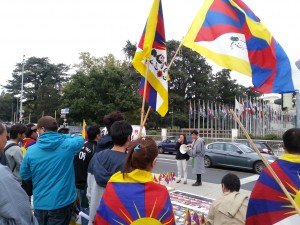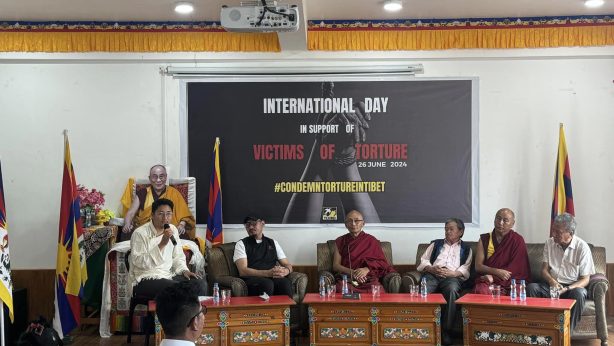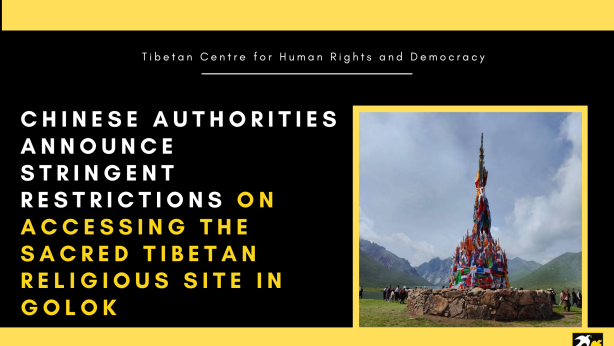TCHRD highlights Tibetan human rights issues at UN

The director of the Tibetan Centre for Human Rights and Democracy (TCHRD), Ms. Tsering Tsomo, attended the 27th session of the Human Rights Council (HRC) at the United Nations in Geneva from 14 to 24 September 2014, to draw the Council’s attention to the pressing human rights issues inside Tibet. On the sidelines of the session, Ms. Tsomo met and briefed various UN Special Procedures mandate holders, diplomats and NGO representatives on the current situation in Tibet and strongly appealed for their support.
In addition to delivering an oral statement (a video of the statement is available here starting at 49:27) on behalf of the Society for Threatened Peoples at the HRC session, Ms. Tsomo held an hour-long briefing for assistants to seven UN Special Procedure mandate holders. On 23 September 2014, Ms. Tsomo met with assistants to Special Rapporteur on religious freedom or belief; Special Rapporteur on freedom of expression and opinion; Special Rapporteur on Torture; Special Rapporteur on right to education; Special Rapporteur on the rights to freedom of peaceful assembly and of association; Working Group on Arbitrary Detention; and Working Group on Enforced or Involuntary Disappearances.
The briefing was held at a meeting room in the Office of the UN High Commissioner for Human Rights in Geneva. In her presentation, Ms Tsomo talked about the new repressive measures implemented since late 2011 in Tibet by the Chinese authorities including mass surveillance and monitoring of religious institutions, human rights defenders, and other civil society groups. She pointed out that the human rights abuses are now more covert and subtle but still undermine the dignity of Tibetans. Especially since the 2008 uprising and the beginning of the self-immolation protests, the assaults on Tibetan human rights have coalesced around three major areas: 1) collective punishment for self-immolators; 2) restrictions on religious belief and practice; and 3) crackdowns on protests. She also answered questions from the Special Procedures staff regarding the specific methods and tactics involved in human rights violations in Tibet. Many questions focused on torture, arbitrary detention, enforced disappearance, right to religious beliefs and right to education. Ms. Tsomo also presented a DVD of Through Flesh and Bones, TCHRD’s new documentary film on torture to the office of the Special Rapporteur on Torture.
On 20 September in Zurich, at a joint event organized by the Tibetan Youth Association in Europe (TYAE) and Swiss Tibetan Friendship Association (GSTF), Ms. Tsomo spoke on current human rights situation in Tibet. In particular, she highlighted the disturbing trend of legalized repression and continued crackdown on non-violent human rights activists and protesters. Ms. Tsomo’s presentation was followed by Mr Namgo Zargo, an eyewitness to the 2011 self-immolation of Phuntsok Jarutsang in Ngaba (Ch: Aba) Tibetan Autonomous Prefecture (Sichuan Province), who talked about the heavy security build-up and arbitrary detentions he witnessed in the aftermath of the self-immolation.
Towards the end of the event, the second cut of TCHRD’s new documentary, Through Flesh and Bones, was screened for the first time outside India. The first cut of documentary was screened on 26 June this year in Dharamsala, India to commemorate the International Day for the Victims of Torture. The documentary screening proved to be an eye-opener for the audience as they were able to learn more about the specific torture methods used by prison authorities in Tibet such as “Tiger Bench” and “Death Bed”. Both the presentation and the screening elicited strong emotions among the audience with many saying that although the situation in Tibet is grim, the personal accounts of torture survivors featured in the documentary give hope to Tibet.

On 22 September, at a side event organized by Tibetan Advocacy Coalition and Nonviolent Radical Party Transnational and Transparty at the UN, Ms. Tsomo spoke as one of panelists about the state of cultural rights, human rights defenders and nomadic herders, looking at the Chinese laws and policies that create and perpetuate these violations. She pointed out the absence of an independent judiciary and lack of effective mechanisms of accountability in the heavily politicized legal system erected by the Chinese authorities in Tibet. She pointed out that the Chinese Constitution is, to an unusual degree, a political document because Article 67 of the constitution gives the power to interpret and enforce the Constitution, not to the judiciary but to Standing Committee of the National People’s Congress, a political body.
Ms. Tsomo spent the rest of her time at the UN lobbying and networking with diplomats and staff of foreign missions, NGO groups and activists apprising them of deplorable human rights situation in Tibet both in written and oral presentations.


